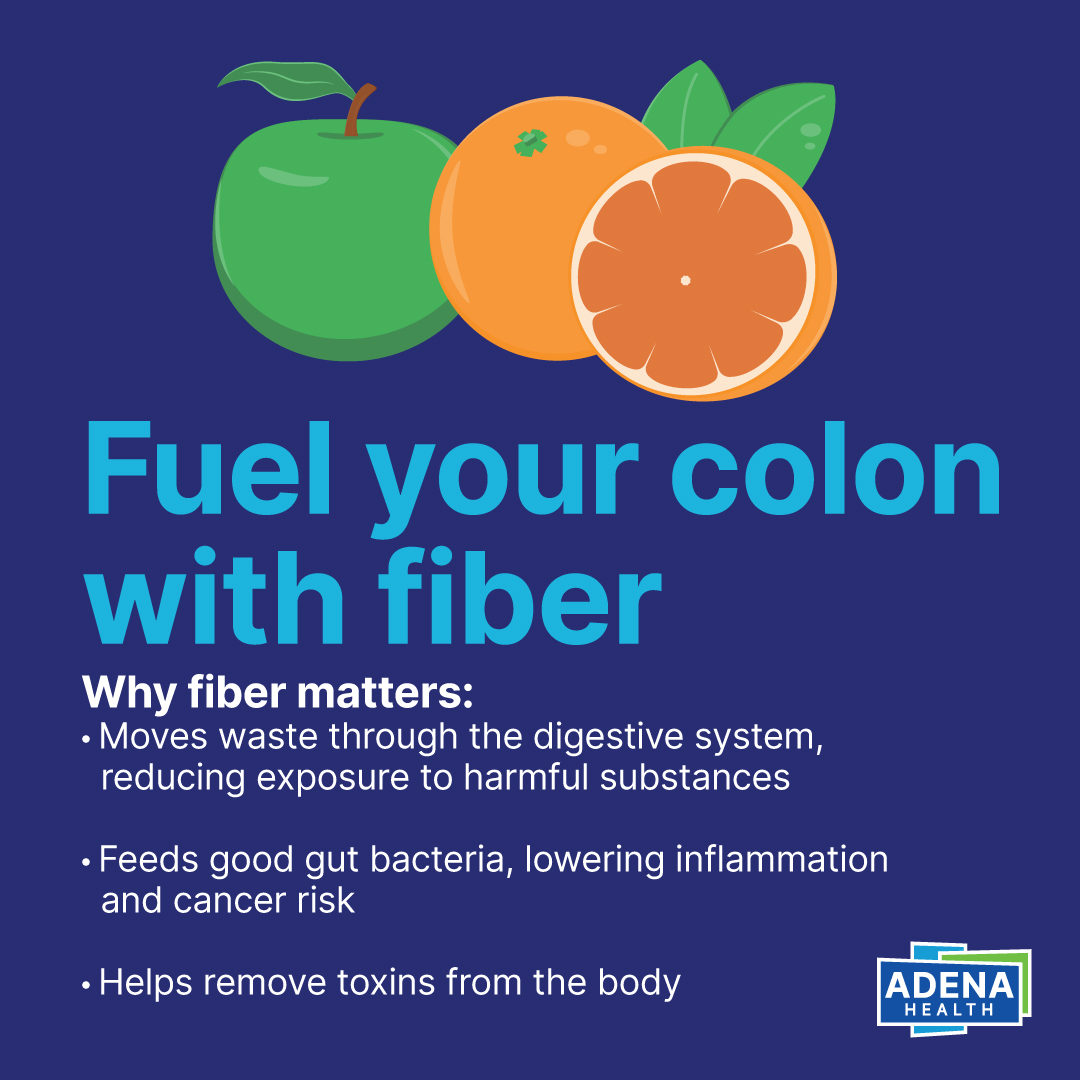Food for thought: Simple ways to reduce your colorectal cancer risk

Colorectal cancer is one of the most common cancers in the United States, and cases continue to rise—especially among younger adults. However, the good news is that your diet can play a powerful role in reducing your risk.
Jessica Flynn, MS, RD, LD, an oncology dietitian at Adena Cancer Center, shares her expertise on how nutrition affects colorectal cancer risk—and what you can do to protect yourself.
“Healthy eating doesn’t mean giving up everything you love,” Flynn explains. “Small, sustainable changes, like swapping in high-fiber snacks or adding more vegetables to your meals, can significantly benefit your digestive health. It’s not about dieting—it’s about improving your health, one meal at a time.”
Why colorectal cancer should be on your radar
Most people don’t think about their colon until something goes wrong. However, with cases rising, particularly in adults under 50, it’s important to be aware.
“There’s strong scientific evidence that healthy dietary habits, physical activity, and maintaining a healthy weight can greatly help reduce your risk of colorectal cancer,” Flynn says.
In fact, research shows that up to 50% of colorectal cancer cases could be prevented through lifestyle changes like diet and exercise. That means what’s on your plate could be one of your best defenses against this disease.
Your colon’s best friend: fiber
If there’s one dietary change you make today, eat more fiber.
“Eating high-fiber foods like whole grains, fruits, vegetables, nuts, seeds, beans, and lentils helps reduce the risk of developing colorectal cancer,” Flynn explains. “Most people don’t realize how easy it is to increase fiber—sometimes it’s as simple as swapping white bread for whole grain or adding beans to your soup.”
Research suggests that every 10g increase in dietary fiber is linked to a seven percent lower risk of developing colorectal cancer.
Fiber works in several ways to support colorectal health:
- ✅ It helps move waste through the digestive system, reducing exposure to harmful substances.
- ✅ It feeds good gut bacteria, which may lower inflammation and cancer risk.
- ✅ It binds to toxins in the colon, helping to remove them from the body.
Eat this, not that: simple swaps for a healthier digestive system
You don’t need to overhaul your entire diet. Just making smart swaps can boost fiber intake and lower colorectal cancer risk.
Change your grains
- ✅ Eat this: Brown rice, quinoa, whole-wheat pasta, whole-grain bread
- ❌ Not that: White rice, white pasta, white bread
Why? Whole grains pack in more fiber and essential nutrients, supporting healthy digestion.
Snack smarter
- ✅ Eat this: Air-popped popcorn, raw veggies with hummus, nuts, and seeds
- ❌ Not that: Potato chips, crackers, processed snack foods
Why? High-fiber snacks keep you full longer and support healthy digestion.
“People assume healthy snacks have to be bland, but that’s not true,” Flynn says. “Try popcorn with a sprinkle of seasoning or hummus with veggies—small tweaks can make snacking both satisfying and good for you.”
Choose whole fruits and vegetables
- ✅ Eat this: Apples (with the skin), berries, carrots, broccoli
- ❌ Not that: Fruit juices, vegetable juices
Why? The fiber is in the skin. Juices strip away fiber, leaving mostly sugar.
Add beans and lentils
- ✅ Eat this: Black beans, chickpeas, lentils in soups, salads, and stir-fries
- ❌ Not that: Processed meats like bacon, hot dogs, and sausage
Why? Beans and lentils are fiber-rich and cancer-fighting, while processed meats increase colorectal cancer risk.
Choose lean proteins over red and processed meats
- ✅ Eat this: Grilled chicken, fish, tofu, or plant-based proteins
- ❌ Not that: Red meats (beef, pork) and processed meats (deli meats, hot dogs)
Why? Processed meats are classified as group 1 carcinogens, meaning they are in the same category as tobacco and asbestos in terms of evidence for cancer risk.
Screenings are the most powerful prevention tool
While a fiber-rich diet is important, it’s only part of the equation. Regular colorectal cancer screenings are essential for early detection and prevention.
“A colon cancer screening, or a colonoscopy, is still the gold standard for catching the disease early,” Flynn says. “Even if you eat the healthiest diet in the world, screenings are non-negotiable—they save lives, because early detection can have a huge impact on outcomes.”
If you’re 45+ or have risk factors, like family history of certain cancers or inflammatory bowel conditions, don’t wait—schedule your colorectal cancer screening today.
- Call 740-779-4550 to schedule your appointment.
- Visit adena.org/colonoscopy to learn more.
Meet our expert: Jessica Flynn, MS, RD, LD
Jessica Flynn, MS, RD, LD is a Clinical Dietitian at the Adena Cancer Center, helping patients use nutrition to lower cancer risk and support recovery. She specializes in making healthy eating simple and practical during and after treatment. Jessica earned her master’s degree in Medical Dietetics from The Ohio State University and has been a registered dietitian since 2022. She works in both oncology and acute care. Before becoming a dietitian, Jessica spent 10 years as a talk radio producer and host. In her free time, she enjoys family time and hiking with her cocker spaniel, Lady Bird.